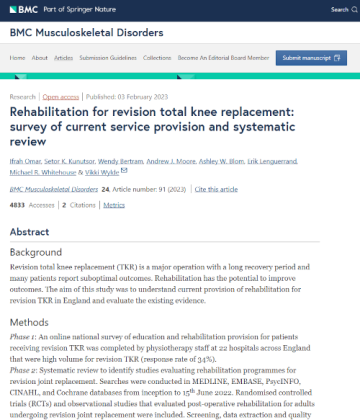Rehabilitation for revision joint replacement
Theme Surgical and orthopaedic innovation
Workstream Interventions to improve patient outcomes after surgery
Status: This project is complete
When a knee replacement fails, a revision operation is needed to remove and replace the artificial knee joint.
A revision total knee replacement is a major operation with a long recovery period. Many patients report difficulties afterwards, such as long-term pain and limited mobility.
Rehabilitation has the potential to improve outcomes for patients who have undergone this type of operation.
Project aims
Our aims were to:
- Survey NHS hospitals across England to understand the rehabilitation currently provided
- Look at the published evidence to find studies that tested rehabilitation programmes
What we found
National survey of hospitals
Most hospitals provided education before the operation, which aimed to prepare patients for revision knee replacement surgery and recovery. This mostly involved a single session delivered by a multidisciplinary team.
Inpatient physiotherapy commonly started on the first day after the operation and was provided twice a day. Most hospitals also provided occupational therapy.
Rehabilitation was often provided in the first four weeks after leaving hospital, either in an outpatient, community or home setting.
In most hospitals, the rehabilitation provided to patients having a revision knee replacement was the same as that provided for a primary knee replacement.
Review of the evidence
We only found three studies, all based on reviewing hospital records.
The studies evaluated intensive inpatient rehabilitation programmes. This consisted of 2-3 hours a day of group or individual physiotherapy, with additional occupational therapy in one study.
All three studies reported improvement in patients’ knee functioning.
All studies were limited by their study design. We couldn’t find any randomised controlled trials testing rehabilitation programmes for revision knee replacement.
What next?
Our work has identified where more research is needed to develop and evaluate tailored rehabilitation, to improve patients’ lives after revision knee replacement.
